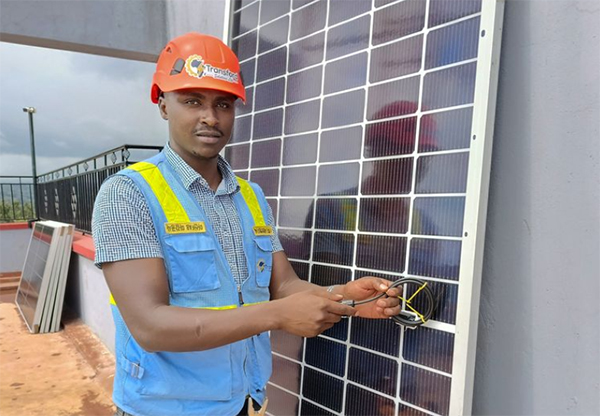
As Africa shifts towards renewable energy, homes, businesses, and institutions are increasingly adopting battery storage systems to reduce reliance on the national grid.
SPECIAL REPORT | BIRD AGENCY | Africa is experiencing a major boom in battery storage, as residential homes, businesses and institutions like hospitals and schools cut down their dependence on national grid power and generators with renewable energy.
Among the key trends being witnessed is the strategic co-location of solar power systems with battery energy storage in order to supply electricity to larger buildings, homes, and machinery.
There is also an increasing use of lithium-powered batteries to operate large appliances, such as TVs, refrigerators, and other home entertainment systems during power outages.
“This a two-bedroom apartment. All the lights, all the pumps are going to run purely on solar for the next 15 years, without worrying about the battery, the inverter, without worrying about anything, they are all going to run 100% on solar,” explained Transford Solutions Solar Engineer John Mwangi during a recent installation some 25 kilometres from Nairobi’s Central Business District, witnessed by bird story agency.
According to Mwangi, the owner of the 20-unit apartment would be saving himself a monthly bill of about US$235 (Sh30,000) to power security lights and CCTV cameras and to pump water to all the units, by installing a 10Kilowatt hour (KWh) lithium battery storage system. Perhaps more importantly, tenants could be sure of an uninterrupted service.
“We have completed numerous installations for residential homes and schools. In fact, schools are realizing their benefits. We have worked with large institutions, many companies, and petrol stations are also embracing solar storage systems,” Mwangi said, to highlight widespread use cases since Transford began distribution and installations of battery storage and solar systems in 2018.
“Power has also become expensive, especially the grid power. First thing, you don’t rely on it, and then it’s too expensive. With lithium batteries, you can run your home without depending on any kind of grid power because you can be able to produce and store power in your own home and use it for 24 hours,” said Mwangi.
Africa’s installed battery storage capacity has been steadily increasing since 2017, growing from just 31 Megawatt hours (MWh) to over 1,600 MWh by 2024, according to the Solar Africa Solar Outlook 2025 report.
The Africa Solar Industry Association (AFSIA) report reveals that the market began to experience significant growth in 2023, with installed capacity tripling from 51 MWh to 157 MWh.
Following this surge, capacity then skyrocketed tenfold to reach 1,641 MWh in 2024.
“The growth kicked in a few years ago with the introduction of lithium batteries which offer a higher level of flexibility and ease of use compared to lead and gel batteries,” said AFSIA in the report.
“The advantage of lithium batteries, is that we get long storage of power and longer period of life unlike the indigenous batteries that usually last two or three years,” said Mwangi.
Mwangi’s comments were echoed by solar engineering experts at Phase Energy, a company that has been distributing and installing battery storage systems in Kenya for the past six years.
Phase Energy Technical Sales Engineer, Esther Watiri argued that the primary advantage of lithium batteries is their ability to charge more quickly and discharge at a slower rate, resulting in lithium batteries having more cycles and longer life spans compared to lead-acid batteries.
“People are investing more in the lithium batteries, probably because the return on the investment is quite high, and everyone wants to get the value for their money. So you’re looking at 15 years plus for the lifespan of those batteries,” said Watiri.
Phase Energy’s Technical Department head, Benard Nyakeno, said the company was experiencing high demand for lithium batteries, largely for industrial and commercial purposes.
“There is more use of lithium batteries for industrial purposes because they have many appliances requiring bigger storage capacity. If you compare one lithium battery with the other normal batteries, the lead-acid ones, you will find that four pieces of lead-acid is equivalent to one piece of lithium battery. So people will go for that bigger storage capacity,” explains Nyakeno.
Over the past 24 months, AFSIA has also reported significant new battery production capacity on the continent, linking this development to the anticipated increase in demand for electric vehicles and e-motorbikes across the continent.
“This has generated economies of scale, but also overcapacity and a higher level of competition between manufacturers. All these factors have then led to sharply decreasing prices,” said the report.
In 2024, the prices of lithium-ion battery packs experienced their largest annual decline since 2017, falling by 20% from 2023 to a record low of US$115 per kilowatt-hour, according to an analysis by the research provider BloombergNEF (BNEF).
The exponential growth in battery storage production shows no signs of slowing down, with the African Solar Industry Association (AFSIA) reporting that it has already identified 18-Gigawatt hour (GWh) worth of projects currently under development.
According to the report, the combination of solar energy and battery storage is becoming standard for new utility-scale projects and for upgrading existing renewable energy plants. As a result, an increasing number of African countries are beginning to issue requests for proposals for such projects.
South Africa is at the forefront of this movement with its Battery Energy Storage Independent Power Producer Procurement Program (BESIPPPP), which was launched in 2023.
“The BESIPPPP program is now in its third bid window, and construction is underway on the projects that won the first bid window, totalling 513 MW/2,052 MWh of battery energy storage systems (BESS),” according to the report.
Similar initiatives for large solar plus storage projects connected to the grid – though not directly linked to specific generation plants – are emerging throughout the continent.
Countries such as Senegal, Malawi, Botswana, Tanzania, Namibia, and Mauritius are also making calls for these types of projects.
In the utility-scale solar plus storage sector, Egypt is leading with a project of 900 MW/720 MWh, followed by Gambia with 100 MW/130 MWh.
South Africa’s first standalone grid-scale, private-sector battery projects
-Mogobe BESS and Oasis Mookodi- with a combined capacity of 180 MW/720 MWh, are expected to enter commercial operation in September 2026.
In early January 2025, renewable energy company AMEA Power announced that it had been awarded two major standalone battery energy storage projects in South Africa, each with a capacity of over 300 MWh as part of Bid Window 2 of the BESIPP.
The company said these projects are expected to play a vital role in enhancing the stability of Eskom’s grid.
“As South Africa continues to grapple with frequent blackouts and load shedding, these BESS projects will help mitigate risks and contribute to the country’s energy security,” said AMEA in a statement.
There are also smaller projects in Togo, Eritrea, South Sudan, and Senegal.
*****
SOURCE: bird story agency
 The Independent Uganda: You get the Truth we Pay the Price
The Independent Uganda: You get the Truth we Pay the Price






